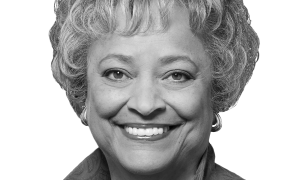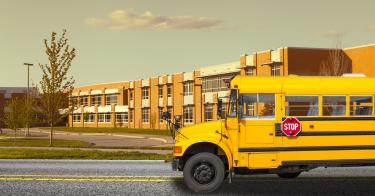On April 20, 1999, two students attacked Columbine High School, killing 13 and wounding 21 more. Two weeks ago, a former student did the same thing at Marjory Stoneman Douglas High School in Parkland, killing 17 and wounding 16 more. Nearly two decades separate these tragedies. Yet, our grieving nation is still searching for a solution.
My children never experienced such horror, thank God. They are now beyond school age, but my grandchildren aren’t. So like mothers and grandmothers across America, I lie awake at night, worrying about the next tragedy and wondering what our society needs to do to prevent it.
The knee-jerk answer by many is “ban guns.” But the questions we face are too complex to be resolved by just two words. Here are 10 that keep me awake.
Public places of all kinds are protected. Why aren’t schools?
Unlike government buildings, stadiums, and shopping malls, schools are known as “soft targets” because they are so unprotected. Isn’t it time for states and localities to seriously consider security solutions such as armed guards, improved locks and cameras, magnetometers, concealed carry, or on-site police substations?
Does the threat facing students only come from the muzzle of a gun?
Since Columbine, the total number of primary and secondary school homicides, including beatings and stabbings, is estimated to be more than three times the number of lives that have been tragically lost to mass shootings on school grounds. All lives are precious, so shouldn’t we be focusing on all threats to school safety?
What if we banned all gun sales in America?
It’s tempting to believe banning gun sales will protect our students, but guns are merely one of many possible tools of destruction. The Columbine attackers brought powerful bombs to school, and a Maryland girl was recently arrested with plans to blow up her school. How would a gun ban have protected their classmates?
What if we severely restricted gun ownership everywhere?
Some say if gun ownership is restricted, peace will be restored. But take a look at Baltimore. It has some of the most restrictive policies in America. Yet, it was just named the nation’s most dangerous city. Criminals clearly aren’t abiding by Baltimore’s rules. Is there any basis for thinking it would be any different elsewhere?
Why is the background check system so full of holes?
America supposedly has a national database containing the information needed to keep criminals from buying a gun. But many state and federal agencies don’t regularly submit data to it, and what it does contain is often incorrect. In this high-technology era, how hard is it to have a background check system that works?
The FBI and police received tips about the Parkland shooter dozens of times. Why didn’t they do something?
I think Andrew Pollack, father of a slain Parkland student, spoke for us all when he expressed fury that his daughter and her school were so unprotected. It would be one thing if the shooter had been unknown. But he made frequent threats and was reported to authorities many times. Why didn’t they take the necessary action?
The Parkland shooter said, “Hi, I’m Nick. I’m a school shooter.” Why wasn’t he institutionalized?
I believe mental health should be treated with the same intensity as physical health. Yet, we see so many instances, like Columbine and Parkland, in which mentally ill individuals are able to commit heinous acts on innocent people. What breakdowns are preventing them from getting the care they obviously need?
He was bullied and ostracized at school. Why was nothing done to address that?
We now know the Parkland shooter was bullied and ostracized by his classmates. So, too, were the Columbine attackers. The U.S. Secret Service has documented that bullying played a major role in two-thirds of America’s premeditated school shootings. Yet, school officials do too little to prevent bullying. Why?
He played violent video games. How many virtual “kills” did he log before he committed real ones?
The Parkland shooter is said to have played violent games 12 or more hours a day. And the Columbine attackers were reportedly obsessed with “Doom”, a violent video game. Some commentators say the violence kids see in movies, on television, and in video games isn’t relevant. But doesn’t this striking coincidence warrant a closer look?
Is America finally ready to get serious about school safety and not just talk in bumper sticker soundbites?
The political debate raging today is so disappointing. If our nation really wants to make schools safer, we have to have a broader and more caring conversation. It must be one that includes mental health, family breakdown, culture, media and more. But instead, some insist on sticking with two-word slogans like “ban guns!” Can’t we do better?
Our children and grandchildren deserve to be safe at school. That means we need to set aside two-word bromides and address these questions in Washington, in state houses, in city halls, and most importantly, in our communities, churches and homes. We can’t allow another tragedy to occur. That’s why it’s time to get serious about school safety.
This piece originally appeared in The Hill on 3/01/18




